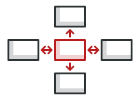
Mediator w języku C#
Mediator to behawioralny wzorzec projektowy pozwalający zredukować sprzężenie pomiędzy komponentami programu poprzez zmuszenie ich do komunikacji za pośrednictwem obiektu zwanego mediatorem.
Mediator ułatwia modyfikację, rozszerzanie i ponowne wykorzystanie komponentów gdyż z jego pomocą nie są one zależne od wielu innych klas.
Złożoność:
Popularność:
Przykłady użycia: Najpopularniejsze zastosowanie wzorca Mediator w kodzie C# to umożliwienie komunikacji pomiędzy komponentami graficznego interfejsu użytkownika. Synonimem nazwy Mediator jest Kontroler — znany z wzorca MVC (ang. Model View Controller — Model Widok Kontroler).
Przykład koncepcyjny
Poniższy przykład ilustruje strukturę wzorca Mediator ze szczególnym naciskiem na następujące kwestie:
- Z jakich składa się klas?
- Jakie role pełnią te klasy?
- W jaki sposób elementy wzorca są ze sobą powiązane?
Program.cs: Przykład koncepcyjny
using System;
namespace RefactoringGuru.DesignPatterns.Mediator.Conceptual
{
// The Mediator interface declares a method used by components to notify the
// mediator about various events. The Mediator may react to these events and
// pass the execution to other components.
public interface IMediator
{
void Notify(object sender, string ev);
}
// Concrete Mediators implement cooperative behavior by coordinating several
// components.
class ConcreteMediator : IMediator
{
private Component1 _component1;
private Component2 _component2;
public ConcreteMediator(Component1 component1, Component2 component2)
{
this._component1 = component1;
this._component1.SetMediator(this);
this._component2 = component2;
this._component2.SetMediator(this);
}
public void Notify(object sender, string ev)
{
if (ev == "A")
{
Console.WriteLine("Mediator reacts on A and triggers following operations:");
this._component2.DoC();
}
if (ev == "D")
{
Console.WriteLine("Mediator reacts on D and triggers following operations:");
this._component1.DoB();
this._component2.DoC();
}
}
}
// The Base Component provides the basic functionality of storing a
// mediator's instance inside component objects.
class BaseComponent
{
protected IMediator _mediator;
public BaseComponent(IMediator mediator = null)
{
this._mediator = mediator;
}
public void SetMediator(IMediator mediator)
{
this._mediator = mediator;
}
}
// Concrete Components implement various functionality. They don't depend on
// other components. They also don't depend on any concrete mediator
// classes.
class Component1 : BaseComponent
{
public void DoA()
{
Console.WriteLine("Component 1 does A.");
this._mediator.Notify(this, "A");
}
public void DoB()
{
Console.WriteLine("Component 1 does B.");
this._mediator.Notify(this, "B");
}
}
class Component2 : BaseComponent
{
public void DoC()
{
Console.WriteLine("Component 2 does C.");
this._mediator.Notify(this, "C");
}
public void DoD()
{
Console.WriteLine("Component 2 does D.");
this._mediator.Notify(this, "D");
}
}
class Program
{
static void Main(string[] args)
{
// The client code.
Component1 component1 = new Component1();
Component2 component2 = new Component2();
new ConcreteMediator(component1, component2);
Console.WriteLine("Client triggers operation A.");
component1.DoA();
Console.WriteLine();
Console.WriteLine("Client triggers operation D.");
component2.DoD();
}
}
}
Output.txt: Wynik działania
Client triggers operation A.
Component 1 does A.
Mediator reacts on A and triggers following operations:
Component 2 does C.
Client triggers operation D.
Component 2 does D.
Mediator reacts on D and triggers following operations:
Component 1 does B.
Component 2 does C.
 OSTATNIE DNI ZIMOWEJ WYPRZEDAŻY!
OSTATNIE DNI ZIMOWEJ WYPRZEDAŻY!
